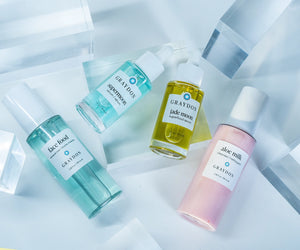Vitamin C is everywhere in skincare. Your favourite influencer is probably using it, and it’s become the star ingredient in products from legacy and indie brands alike. Maybe your daughter, bestie, or even your dermatologist has recommended it to you. Maybe you’ve already tried a plethora of vitamin C products! Walk into a nearby beauty store or pharmacy and you’ll be spoiled for choice.
The reason vitamin C gets so much love is because it truly is a great antioxidant ingredient that protects the skin from oxidative stress, collagen breakdown, and skin aging, as well as brightens dark spots and helps with uneven skin tone.
But… People with sensitive skin tend to react to it, especially the potent form used in skincare products, L-ascorbic vitamin C. That’s because the ingredient has a low pH (so it's not balanced to your skin), which can weaken your skin barrier and cause inflammation or acne.
Vitamin C and other actives like retinol, lactic acid, and glycolic acid have a lower pH level than your skin, which can cause irritation.
With vitamin C being so popular and well-loved, it can feel like you’re missing out or doing your skin a disservice by not including it in your routine (especially when derms, influencers, and beauty experts alike recommend it).
We’re here to tell you that you’re not doing your skin a disservice. If your skin is reactive to vitamin C (you can find out by doing a patch test), there’s plenty of gentler alternatives that will keep your skin healthy and target the concerns you have.
Vitamin C is an antioxidant, and there are so many other antioxidant ingredients out there that you can include in your routine. Protecting from oxidative stress and collagen breakdown are common benefits many antioxidant-rich ingredients offer. Vitamin C is not the only option!
Skin Therapist Seanna Cohen shares, “I would stress that there are many other forms of antioxidants that can be included in skincare that offer similar benefits to vitamin C. In any skincare routine, especially in any good ‘healthy aging routine’, I suggest antioxidants take a leading role in every daily routine, whether it’s vitamin C or not. Serums are often the most potent and efficient form.”
Seanna makes another great point. When searching for sensitive skin-friendly alternatives to vitamin C, look for them in a serum. Why? The thinner texture of a serum allows ingredients to absorb into the skin more easily.
Now that you know why vitamin C can be irritating, let’s dive into some other options that will have you saying “C you later” to vitamin C!
Sensitive Skin Friendly Alternatives to Vitamin C
Moringa Oleifera
We’re breaking the rules right out of the gate because moringa is actually a botanical vitamin C. However, moringa is far less likely to sensitize your skin. It has anti-inflammatory properties and is full of skin nourishing fatty acids like oleic acid so it soothes and hydrates rather than irritates.

On top of vitamin C, moringa contains a substantial amount of magnesium, iron, folate, and vitamins A, B6, and E. These other antioxidant-rich vitamins (alongside vit C) make moringa an ingredient that is super protective and purifying–that’s why it’s at the heart of Supermoon Serum’s anti-pollution complex.
For skincare lovers who are looking for an alternative that will help with fine lines and wrinkles, as well as collagen production and skin firmness, you’re in luck. Moringa offers those benefits too.
Curious to learn more about moringa as a botanical vitamin C? We wrote an entire article on it.
Find moringa in Supermoon Serum. If you’re looking for a direct dupe of a vitamin C or vitamin C derivative serum, we suggest you try this one.
Niacinamide
Hi 👋 Another antioxidant here. Niacinamide is known for being a gentle skincare superstar. It offers many of the same benefits as a vitamin C: protection from environmental factors and oxidative damage, even skin tone/help with hyperpigmentation, and increased collagen production. On top of that, niacinamide improves skin dullness and the appearance of pores.

What sets niacinamide apart from vitamin C is that it’s an ingredient that strengthens the skin barrier rather than weakens it. That’s why it's not likely to sensitize your skin. Another perk is niacinamide is especially great for anyone dealing with acne or rosacea.
Most of the time, we automatically pair mature and dry skin types together. It leaves us feeling like acne and mature skin need to be cared for one at a time, with separate products for each. You also wouldn’t necessarily think that one ingredient could improve rosacea and fine lines/wrinkles at the same time. We think of these as requiring different sets of ingredients.
Well, here comes niacinamide! It’s gentle, multifunctional, and not just suitable but beneficial for all skin types.
Niacinamide is a gentle ingredient all skin types can benefit from.
Find niacinamide in Aloe Milk Cleanser.
P.S. Oops, we’re going against our own advice from above. Aloe Milk isn’t a serum. Here’s how to get the greatest impact out of the niacinamide in this cleanser: use it as a face mask and leave it on for 15 minutes before washing it off. Voila! You’ve turned Aloe Milk into a gentle, daily face mask and a cleanser! Talk about multitasking 🤹♀️
Need a little more? There are lots of niacinamide serums out there–it’s an incredibly popular ingredient!
Turmeric
Turmeric is a superfood spice with over 4,000 years of Ayurvedic medicinal use due to its powerful anti-inflammatory and antimicrobial properties. Not only is it tasty and healing, It’s also a potent skincare ingredient.

What makes turmeric an alternative to vitamin C is the fact that it’s a carotenoid, meaning it’s–you guessed it–an antioxidant! The beta-carotene in turmeric is known to improve the appearance of fine lines and wrinkles and curcumin stimulates collagen production. Turmeric is also a brightening ingredient like vitamin C.
Though turmeric has more recently exploded in popularity in the west as a skincare ingredient, eastern cultures have known how beneficial turmeric is as a skincare ingredient for literal centuries. If you want an alternative to vitamin C with a long, proven history, give turmeric a try.
Find turmeric in Jade Moon Superfood Serum and Putty.
Bakuchiol
Bakuchiol is actually better known as an alternative to retinol. But since bakuchiol offers the same skin firming/smoothing and brightening benefits as vitamin C, it’s a competent and natural alternative to both popular ingredients.

Bakuchiol is good for sensitive skin because, unlike traditional retinol, it won’t leave your skin sensitized to the sun. Another reason it's good for sensitive skin? Bakuchiol comes from the Bakuchi/Babchi herb, which is another ingredient used in Ayurvedic healing. Just like turmeric, it's known for its anti-inflammatory and antimicrobial properties. Skin issues like eczema can be soothed with bakuchiol.
Bakuchiol is an antioxidant just like retinol and vitamin C, so you’re also getting all the protective benefits an antioxidant offers.
Find bakuchiol in Phyto Clear and Supermoon Serum.
P.S. There are two other ingredients on this list that qualify as retinol alternatives because of their antioxidant abilities. See if you can guess which, then check here to see if you’re right 😉
Green Tea Extract
Guess what? We’re mentioning another anti-inflammatory, antimicrobial antioxidant (say that 3 times fast!) Green tea extract has similar benefits to most of the alternatives we’ve mentioned; it protects from oxidative damage, evens skin tone, prevents fine lines and wrinkles, soothes redness, and stimulates collagen production.
It’s also a traditional ingredient with a long history of healing use. On top of its benefits as an alternative to vitamin C, it also helps regulate sebum production in the skin, making it a toning ingredient that's great for acne and oily skin type. We include it in our Face Food Mineral Mist and Aloe Milk Cleanser for this reason! Like niacinamide, green tea extract can also help with rosacea.
Find green tea extract in Face Food Mineral Mist, Aloe Milk Cleanser, Face Glow, Matcha Mint Shampoo, and Matcha Mint Hair Smoothie.
Azelaic Acid
We’re switching things up. Azelaic Acid is the only ingredient on this list that isn’t an antioxidant. Azelaic acid’s main superpower is that it is a gentle brightening ingredient, as it’s a melanin inhibitor. It’s often used on dark spots and hyperpigmentation, and is an effective remedy specifically for acne scars due to its combination of brightening + anti-inflammatory benefits.
As a gentle exfoliant, dullness and clogged pores melt away under this ingredient, leaving a refined skin texture. Azelaic acid also helps with acne because it kills bacteria–this makes it ideal for inflamed acne in particular. It’s also good for rosacea.
Look for the “anti” power team: antioxidant, antimicrobial, anti-inflammatory.
Find azelaic acid in Face Foam. Get the most out of the azelaic acid in Face Foam by spending a few minutes working the cleanser into the skin using an exfoliating tool like a sponge or washcloth.
Put Your Skin’s Health First
So many skincare lovers swear by vitamin C. But, at the end of the day, if your skin can’t tolerate it, you’re not missing out. The grass isn’t greener–there are alternatives that can make your sensitive skin look and feel incredible. If you’re feeling left out because you can’t be part of the vitamin C lovers club, don’t fret. Finding an alternative that works for you means you’re taking care of the overall health and longevity of your skin 💙

When you have sensitive skin, it’s a gamble every time you try a new product. "Will I react?" gets asked every time you try something new. That’s why samples are a must. We've got you covered on that front: check out our samples here.
P.S. (Final P.S, we promise!) Our samples are large enough for multiple uses so you can do everything from patch test to try out a few days of application.



